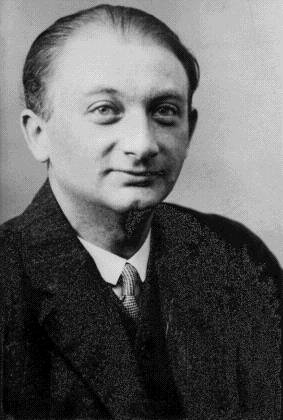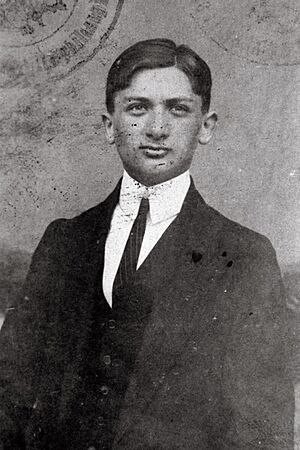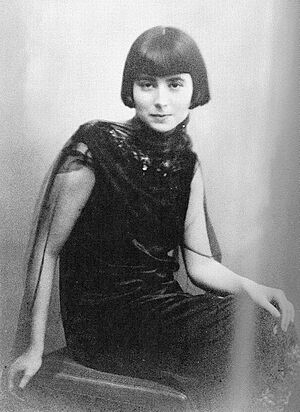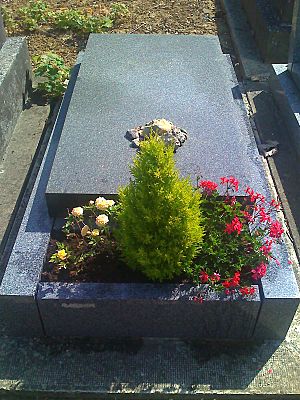Joseph Roth facts for kids
Quick facts for kids
Joseph Roth
|
|
|---|---|

Roth in 1926
|
|
| Born | Moses Joseph Roth 2 September 1894 Brody, Galicia, Austria-Hungary (now in Ukraine) |
| Died | 27 May 1939 (aged 44) Paris, France |
| Resting place | Cimetière de Thiais |
| Occupation | Journalist, novelist |
| Language | German |
| Nationality | Austrian |
| Alma mater | University of Vienna |
| Period | Interwar period |
| Years active | 1920s – 1939 |
| Notable works | Radetzky March, The Legend of the Holy Drinker |
| Spouse | Friederike (Friedl) Reichler |
| Partner | Irmgard Keun |
| Signature | |
Moses Joseph Roth (born September 2, 1894 – died May 27, 1939) was an Austrian-Jewish journalist and writer. He is famous for his novel Radetzky March (1932). This book tells the story of a family during the time the Austro-Hungarian Empire was falling apart.
Roth also wrote Job (1930), which explores Jewish life. His important essay "Juden auf Wanderschaft" (1927), known in English as The Wandering Jews, describes how Jewish people moved from eastern to western Europe after World War I and the Russian Revolution. In recent years, more people have become interested in Roth's works, especially his novels and collected newspaper articles.
Contents
Joseph Roth's Early Life and Career
Joseph Roth was born into a Jewish family. He grew up in Brody, a small town in what was then Austrian Galicia. This area is now part of Ukraine. Jewish culture was very important in Brody, which had many Jewish residents.
Roth lived with his mother and her relatives. He never met his father, who had disappeared before Joseph was born.
University and War Experience
After finishing high school, Joseph Roth moved to Lemberg in 1913 to start university. In 1914, he moved to the University of Vienna to study philosophy and German literature.
In 1916, Roth stopped his studies. He joined the Austro-Hungarian Army and served on the Eastern Front during World War I. This experience deeply affected his life.
The collapse of the Habsburg Empire in 1918 also had a big impact. Roth often wrote about feeling "homeless" after his homeland was gone. He once said that the war and the end of the empire were his strongest experiences.
Family Life and Challenges
Roth married Friederike (Friedl) Reichler in 1922. In the late 1920s, his wife became very ill with a serious mental condition. This caused Roth great emotional and financial difficulty. She lived in a special care home for many years. Sadly, she was later killed as part of a terrible program by the Nazis.
In 1929, Roth met Andrea Manga Bell. She was an editor for a magazine. Their relationship later ended due to money problems and Roth's worries.
From 1936 to 1938, Roth was close with writer Irmgard Keun. They worked together and traveled to many cities like Paris, Vienna, and Amsterdam.
Later Life and Beliefs
As a well-known liberal Jewish journalist, Roth left Germany when Adolf Hitler became leader in 1933. He spent most of his last six years in Paris, a city he loved. His writings from France show how much he enjoyed the city and its culture.
Roth was Jewish, but he also became very interested in Catholicism. Some people believe he may have converted to Catholicism later in his life.
In his final years, Roth moved often between hotels. He worried a lot about money and the future. He continued to write many books until he passed away in Paris in 1939. His last short novel, The Legend of the Holy Drinker, was published in 1939.
Joseph Roth died from pneumonia on May 27, 1939. He was buried a few days later in the Cimetière de Thiais, a cemetery south of Paris.
Joseph Roth's Writing Career
In 1918, Roth returned to Vienna and started writing for newspapers that supported left-wing ideas. He sometimes signed his articles as Der rote Joseph (The red Joseph).
In 1920, he moved to Berlin and became a successful journalist. He wrote for several newspapers, including the Frankfurter Zeitung. For this newspaper, he traveled widely across Europe. He reported from places like France, the USSR, Poland, and Italy. His main English translator, Michael Hofmann, said that Roth was one of the best-paid journalists of his time.
Roth is known as one of the writers who helped create what is called the Habsburg Myth. This refers to a certain way of looking back at the old Austro-Hungarian Empire.
Novels and Themes
In 1923, Roth's first novel, The Spider's Web, was published in parts in a newspaper. He became moderately successful with his novels, which explored life in Europe after World War I. However, he became truly famous for his fiction after Job and Radetzky March were published.
After 1930, Roth's novels began to focus less on current society. He felt disappointed with the world around him. Instead, he started to write with a sad feeling of nostalgia for life in imperial Central Europe before 1914.
He often wrote about people who were wanderers, looking for a place to belong. This included Jewish people and former citizens of the old Austria-Hungary. These people had lost their "true home" when the monarchy ended. In his later works, Roth seemed to wish that the monarchy could be brought back. His desire for a more accepting past might have been a reaction against the extreme politics of his time, especially National Socialism in Germany.
Radetzky March (1932) and "The Bust of the Emperor" (1935) are good examples of his later style. In another novel, The Emperor's Tomb (1938), Roth describes the life of a character related to the hero of Radetzky March. This story goes up to Germany's takeover of Austria in 1938.
Published Works
Fiction
- The Spider's Web (Das Spinnennetz) (1923, adapted in 1989 into a film of the same title)
- Hotel Savoy (1924)
- The Rebellion (Die Rebellion) (1924; some editions of the English translation call it simply Rebellion)
- "April: The Story of a Love Affair" (April. Die Geschichte einer Liebe) (1925; in The Collected Stories)
- "The Blind Mirror" (Der blinde Spiegel) (1925; in The Collected Stories)
- Flight without End (Die Flucht ohne Ende) (1927)
- Zipper and His Father (Zipper und sein Vater) (1928)
- Right and Left (Rechts und links) (1929)
- The Silent Prophet (Der stumme Prophet) (1929)
- Job (Hiob) (1930)
- Radetzky March (Radetzkymarsch) (1932; some English translations call it The Radetzky March)
- "Fallmerayer the Stationmaster" (Stationschef Fallmerayer) (1933; in The Collected Stories)
- Tarabas (1934)
- "The Bust of the Emperor" (Die Büste des Kaisers) (1934; in The Collected Stories)
- Confession of a Murderer (Beichte eines Mörders) (1936)
- The Hundred Days (Die hundert Tage) (1936)
- Weights and Measures (Das falsche Gewicht) (1937)
- The Emperor's Tomb (Die Kapuzinergruft) (1938)
- The String of Pearls (Die Geschichte von der 1002. Nacht) (1939)
- The Legend of the Holy Drinker (Die Legende vom heiligen Trinker) (1939)
- "The Leviathan" (Der Leviathan) (1940; in The Collected Stories)
- The Collected Stories of Joseph Roth, trans. by Michael Hofmann, New York: W. W. Norton (2003)
Non-Fiction
- The Wandering Jews (Juden auf Wanderschaft) (1927; reportage)
- The Antichrist (Der Antichrist) (essay, 1934)
- What I Saw: Reports from Berlin, 1920–1933, trans. by Michael Hofmann, New York: W. W. Norton (2002) and London: Granta Books (2003)
- The White Cities: Reports from France, 1925–39, trans. by Michael Hofmann, London: Granta Books (2004); issued in the United States as Report from a Parisian Paradise: Essays from France, 1925–1939, New York: W. W. Norton & Company (2004)
- Joseph Roth: A Life in Letters, trans. and edited by Michael Hofmann, New York: W. W. Norton (2012)
- The Hotel Years, trans. and edited by Michael Hofmann, New York: New Directions (2015)
Film Adaptations of Joseph Roth's Works
- Sins of Man, directed by Otto Brower (1936, based on the novel Job), starring Jean Hersholt
- Die Rebellion, directed by Wolfgang Staudte (TV film, 1962, based on the novel Rebellion), starring Josef Meinrad
- Die Legende vom heiligen Trinker, directed by Franz Josef Wild (TV film, 1963, based on the novel The Legend of the Holy Drinker), starring Hannes Messemer
- Radetzkymarsch, directed by Michael Kehlmann (TV film, 1965, based on the novel Radetzky March), starring Helmuth Lohner
- Die Geschichte der 1002. Nacht, directed by Peter Beauvais (TV film, 1969, based on the novel The String of Pearls), starring Johanna Matz
- Beichte eines Mörders, directed by Wilm ten Haaf (TV miniseries, 1969, based on the novel Confession of a Murderer), starring Hannelore Elsner
- Trotta, directed by Johannes Schaaf (1971, based on the novel The Emperor's Tomb), starring Doris Kunstmann
- Das falsche Gewicht, directed by Bernhard Wicki (1971, based on the novel Weights and Measures), starring Helmut Qualtinger
- Stationschef Fallmerayer, directed by Walter Davy (TV film, 1976, based on the novella Stationschef Fallmerayer), starring Odile Versois
- Job, directed by Michael Kehlmann (TV miniseries, 1978, based on the novel Job), starring Günter Mack
- Geschichte einer Liebe, directed by Dagmar Damek (TV film, 1978, based on the story April: The Story of a Love Affair), starring Bruno Ganz
- Tarabas, directed by Michael Kehlmann (TV film, 1981, based on the novel Tarabas), starring Helmuth Lohner
- Die Flucht ohne Ende, directed by Michael Kehlmann (TV film, 1985, based on the novel Flight without End), starring Helmuth Lohner and Mario Adorf
- The Legend of the Holy Drinker, directed by Ermanno Olmi (1988, based on the novel The Legend of the Holy Drinker), starring Rutger Hauer
- Spider's Web, directed by Bernhard Wicki (1989, based on the novel The Spider's Web), starring Ulrich Mühe, Armin Mueller-Stahl and Klaus Maria Brandauer
- Die Rebellion, directed by Michael Haneke (TV film, 1993, based on the novel Rebellion)
- Radetzkymarsch, directed by Axel Corti (TV miniseries, 1994, based on the novel Radetzky March), starring Max von Sydow and Charlotte Rampling
See also
 In Spanish: Joseph Roth para niños
In Spanish: Joseph Roth para niños




